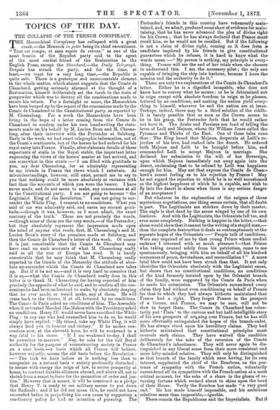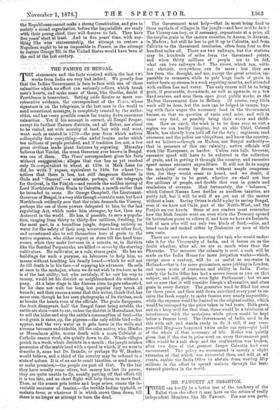TOPICS OF THE DAY.
THE COLLAPSE OF THE FRENCH CONSPIRACY.
THE Monarchical Conspiracy has collapsed with a great crash,—the Monarch in petto being its chief executioner. "Tout eat rompu, et sans espoir de retour," as one of the most frantic of the Royalist party said to the agent of the most cordial friend of the Restoration in the English Frees, except the Standard,—the Daily Telegraph. Despair has struck the party, and for the time, at least,—we trust for a very long time,—the Republic is quite safe. There is a grotesque and unaccountable element in the whole matter, which almost suggests that the Comte de Chambord, getting seriously alarmed at the thought of a Restoration, himself deliberately set the torch to the train of gunpowder which was to destroy all the combinations made to secure his return. For a fortnight or more, the Monarchists have been buoyed up by the report of the concessions made by the Comte de Chambord to the Constitutional party, as reported by M. Chesnelong. For a week the Monarchists have been living in the hope of a letter coming from the Comte de Chambord to confirm under his own handwriting the state- ments made on his behalf by M. Lucien Brun and M. Chesne- long, after their interview with the Pretender at Salzburg. Early in the week, we had exact telegraphic information, not of the Count's sentiments, but of the horses he had ordered for his royal entry into France. Finally, after elaborate details of these expectants of stalls in the Royal stable, the important letter expressing the views of the horses' master at last arrived, and ran somewhat in this strain :—' I am filled with gratitude to you, my dear Chesnelong, for so admirably representing ,to my friends in France the views which I entertain. As misunderstandings, however, still exist, permit me to say to you that nothing could he more absolutely at variance with fact than the accounts of which you were the bearer. I have never made, and do not mean to make, any concessions at all to the Constitutional party. I am not going to become "the Legitimist King of the Revolution." I am not going to sur- render the White Flag. I consent to no conditions. What you said of me was admirably said, and earns my eternal grati- tude,—though it was, however, as I must admit, the exact contrary of the truth.' These are not precisely the words, —though some of them are the very words,—of the Pretender.; but they absolutely represent the impression made upon the mind of anyone who reads, first, M. Chesnelong's and M. Lucien Brun's story of the promises made at Salzburg, and then the Comte de Chambord's letter of this week. Of course it is just conceivable that the Comte de Chambord may have read no such accounts of what M. Chesnelong really said as all the rest of Europe has read. It is barely conceivable that he may think that M. Chesnelong really reported to the friends of the Monarchy the attitude of abso- lute no-surrender which the Comte de Chambord now takes up. But if it be not so,—and it is very hard to conceive that it is so,—what the Comte de Chambord really does in this letter is to thank M. Chesnelong for having reported of him precisely the opposite of what he said, and to confirm all the con- Cessions he had been understood to make, by absolutely denying that he ever made, or would make, any of them. He will come back to the throne, if at all, fettered by no conditions. The Comte de Paris asked no conditions of him. The Assembly when it entrusted Marshal MacMahon with the Presidency asked no conditions. Henry IV. would never have sacrificed the White Flag : to any one who had counselled him to do so, he would simply have replied, "My friend, take my White Flag, it will always lead you to honour and victory." If he makes con- cessions now, at the eleventh hour, he will be weakened in a way fatal to his cause. "If I am weakened to-day, I shall be powerless to-morrow." Nay, he asks for the full Royal authority for the purpose of reconstructing society in France on a sure basis,—a basis which all France will believe, however unjustly, means the old basis before the Revolution : —" The task we have before us is nothing less than to reorganise on a natural basis a society profoundly disturbed ; to secure with energy the reign of law, to revive prosperity at home, to contract durable alliances abroad, and above all, not to shrink from a resort to force for the promotion of order and jus- tice." However that is meant, it will be construed as a pledge that Henry V. is ready to use military means to put down the Radicals ; and if he did not mean this, he could not have succeeded better in prejudicing his own cause by suggesting a reactionary policy he had no intention of pursuing. The
Pretender's friends in this country have vehemently main- tained, and, we admit, produced some shay; of evidence for main- taining, that he has never advanced the plea of divine righb for his Crown ; that he has always declared that France must; recall him, or he would not be recalled. But if the following' is not a claim of divine right, coming as it does from to candidate implored by his friends to give constitutional' guarantees which he refuses, it is hard to know what the-
words mean My person is nothing, my principle is every- thing. France will see the end of her trials when she chooses to understand this. I am -the necessary pilot ; the only one capable of bringing the ship into harbour, because I have the mission and the authority to do it."
There are only two explanations of the Comte de Charnbord'e letter. Either he is a dignified incapable, who does not know how to convey what he means ; or he is determined not- to reign except with absolute freedom to reign as he pleases,. fettered by no conditions, and making the nation yield every- thing to himself, wherever he and the _nation are at issue. Perhaps, indeed, there may be a third solution of the riddle. It is barely possible that as soon as the Crown seems to- be in his grasp, the Pretender feels that he would rather not have it. The Arabs and Persians are fond of telling the- loves of Leili and Majnun, whom Sir William Jones called the- Pyramus and Thisbe of the East. One of these tales rune. thus: The King heard that Majnun, 'desperate at Leili's re- jection of his love, had rushed into the desert. He ordered both Majnun and Leili to be brought before him, and commanded Leili to accept Majnun in marriage. She- declared her submission to the will of her Sovereign,. upon which Majnun immediately ran away again into the desert, exclaiming that to be refused by Leili was happiness enough for him. May not that express the Comte de Chain- bord's recent feeling as to his rejection by France ? May he not regard the rejection to which he is so well accustomed as the highest happiness of wbich he is capable, and wish to. fly into the desert in alarm when there is any serious danger of an acceptance'?
But whatever be the explanation of the enigma of these mysterious negotiations, one thing seems certain, that all doubt is past. The Legitimists are stricken down by their master.. The eagle is shot dead by the arrow winged by one of its own feathers. And with the Legitimists, the Orleanists fail too, and) even more completely. Nothing is happier in the letter,—that alone would show that it cannot be the writing of a stupid man,— than the complete destruction it deals so contemptuously at the separate hopes of the Orleanists :—" People talk of conditions. Were any required of me by that young Prince whose cordial embrace I returned with so much pleasure I—that Prince who, taking counsel solely from his patriotism, came to me spontaneously, bringing with him on behalf of all his kindred assurances of peace, devotedness, and reconciliation ? " A more fatal blow could not have been struck than that. It not only. identifies the Orleanists absolutely with the Legitimist cause, but shows that no constitutional conditions, no conditions of the kind formerly insisted upon by the Orleanist branch of the family, were suggested by the Comte de Paris when he made his submission. The Orleanists surrendered every claim they had without even conditioning on behalf of Franca for that to which they had always hitherto maintained that France had a right. They forgot France in the prospect of a throne, and France, we may be sure, will not be slow to forget them. The Comte de Chambord has volun- tarily put ' Finis ' to the curious and but half-intelligible story of his own prospects of reigning over France, but he has still more effectually extinguished the hopes of the branch-cadet. He has always stood upon his hereditary claims. They had hitherto maintained that constitutional principles must overrule such claims. They have waived this condition deliberately for the sake of the reversion of the Comte de Chambord's inheritance. They will never again be dis- tinguished in any liberal sense from their more consistent and more lofty-minded relative. They will only be distinguished as that branch of the family which once having, for its own interest, supplanted the chief of the Bourbons, on the pre- tence of sympathy with the French nation, voluntarily surrendered all its sympathies with the French nation at a most critical moment, for the sake of a share in the gleam of re- turning fortune which seemed about to shine upon the head of their House. Verily the Bourbon has made "a yery good end." He has made himself impossible, and his ambitious relatives more than impossible,—ignoble. There remain the Republicans and. the Imperialists. But if the Republicans cannot make a strong Constitution, and give to society a sound organisation, before the Imperialists are ready with their young chief, they will deserve to fail. They have Ave years' start at least. And in five years time, with any- thing like wise *statesmanship, the attempt to restore a Napoleon ought to be as impossible in France, as the attempt to restore George IlL in the United States would have been at the end of the last century.



































 Previous page
Previous page